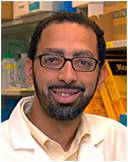Grantee Spotlight: Levi Garraway
 |
Levi A. Garraway, M.D., Ph.D. Assistant Professor, Department of Medicine, Harvard Medical School Assistant Professor of Medicine, Medical Oncology Service, Dana-Farber Cancer Institute Administrative Assistant: Lydia Gregg Medical Oncology Service, Dana-Farber Cancer Institute 44 Binney Street, Boston, MA, 02115 phone: 617-632-4940 email: lydia_gregg@dfci.harvard.edu |
When Levi Alexander Garraway, M.D., Ph.D. begins his day as Assistant Professor of Medicine in the Department of Medical Oncology at the Dana-Farber Cancer Institute in Boston, a part of his father's inspiration and knowledge of science goes with him.
Garraway studies the human genome, drug resistance and cancer. But it was Levi's father that inspired the younger Garraway to pursue cancer medicine. Michael Oliver Garraway, Ph.D. (Garraway's father) was a professor of plant pathology at Ohio State University when he was diagnosed with a highly aggressive form of prostate cancer. The tragedy of this disease was so overwhelming to the Garraway family, the younger Garraway knew he wanted to be an oncologist to help others like his dad. His father, who died on June 12, 1999, always instilled in his children a love for science, but also for disparities research.
Given Dr. Garraway's commitment to disparities research, it came as no surprise that Dr. Levi Garraway agreed last September to become Program Committee Chairperson of the Third American Association for Cancer Research (AACR) Conference on the Science of Cancer Health Disparities in Racial/Ethnic Minorities, and the Underserved, held in Washington, D.C. The conference was co-sponsored by AACR, the NCI Center to Reduce Cancer Health Disparities and the Susan G. Komen Foundation for the Cure, highlighted recent advances in cancer health disparities research.
Garraway is pursuing combined genomic and functional approaches to the characterization of human solid tumors, with an emphasis on melanoma and prostate cancer. For the past several years, Garraway has been concentrating on a "comprehensive characterization of a large collection of patient-derived melanoma "short-term" cultures and cell lines, applying both computational and experimental approaches to identify target genes and pathways enacted by these alterations.
Some of the more prominent examples of his work include the MAP kinase pathway, which is activated by oncogene mutations involving BRAF or NRAS in the vast majority of melanomas, and the P13 kinase pathway, which is activated in many human cancers. Last August, Garraway's lab published a paper in "Nature Genetics," identifying genes and signaling pathways involved in various soft tissue sarcoma subtypes, suggesting potential treatment targets for the disease.
Inspiring young people to pursue science, particularly minorities is a key role that Garraway sees for himself as a cancer researcher. Garraway says he was fortunate to learn and study science at Harvard from some of the best scientists in the business. His life has always been punctuated by special people who felt concerned to make Garraway a better doctor and scientists.
Garraway holds a particular gratitude to Dr. Michael Comb, now President and CEO of Cell Signaling Technology INC whose present interest is in the communication that occurs within and between cells. In cancer, this communication is defective. But by understanding the nature of the communication and the ways that it is changed in cancer, Dr Comb hopes to help develop better treatments and diagnostic tools. At Harvard, Comb influenced Garraway to become a cancer research.
The other person who encouraged Garraway's career was the late Harvard Professor, Dr. Harold Amos, a noted microbiologist, Harvard Medical Chairman, and U.S. Presidential Adviser. Amos who died at the age of 84 in 2003, took a keen interest in students from diverse backgrounds at Harvard but particularly in Garraway.
"At the time, these two men had extraordinary faith in my ability to succeed and be what only I could dream of becoming," Garraway said. "What they saw in me at that time, I will never know, but they never gave up on me, and to them I am extremely grateful."
Today, the Harold Amos Medical Faculty Development Program has been established to increase the number of faculty from historically disadvantaged backgrounds who can achieve senior rank in academic medicine and who will encourage and foster the development of succeeding classes of such physicians. Four-year postdoctoral research awards are offered to universities, schools of medicine and research institutions to support the research and career development of physicians from historically disadvantaged backgrounds who are committed to developing careers in academic medicine and to serving as role models for students and faculty of similar background.
Dr. Garraway was born in Oakland, California. He received his A.B. in Biochemical Sciences from Harvard College in Cambridge in 1990. He received his M.D. from Harvard Medical School, and his Ph.D. in Biological Chemistry and Molecular Pharmacology both in 1999.
He completed his medical internship and residency in Internal Medicine at the Massachusetts General Hospital, where he also served as Medical Chief Resident in 2003. He received his fellowship training in medical oncology at the Dana-Farber Cancer institute. He currently leads a 16-member investigative team in cancer genomics as a faculty member of Dana-Farber's Center for Cancer Genome Discovery. He is co-director of Cancer Genome Analysis in the Broad Cancer Program.
The recipient of numerous awards and honor, Garraway received the Minority Scholar Award from the American Association for Cancer Research, the Partners in Excellence Award from Massachusetts General Hospital, and the Career Award in the Biomedical Sciences from the Burroughs-Wellcome Fund. In the fall of 2007, Dr Garraway was awarded the New Innovator Award from the National Institutes of Health, worth $1.5 million over the next five years. The NIH Innovator Award is presented to the top 29 scientists from more than 2,200 applicants nationwide.
